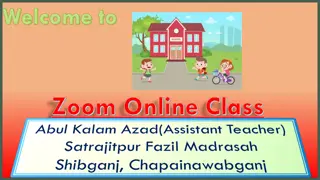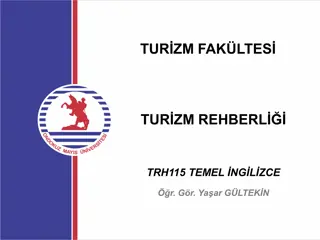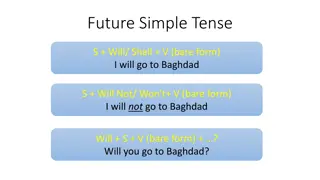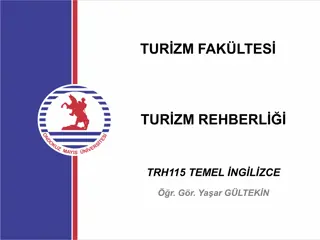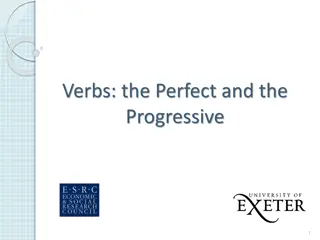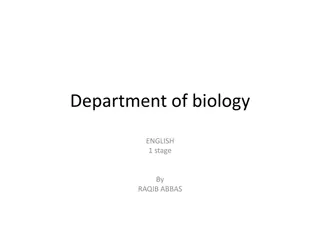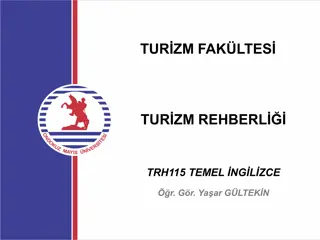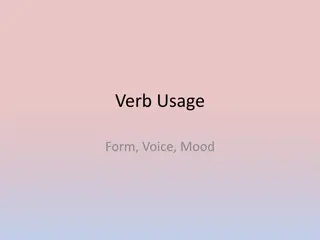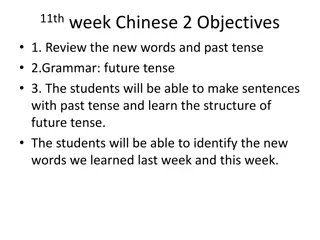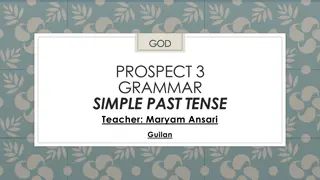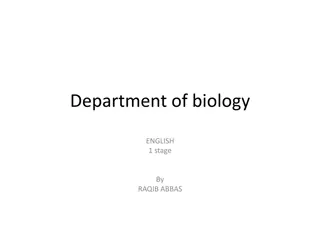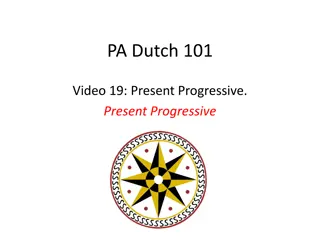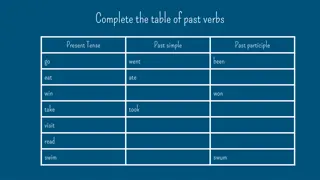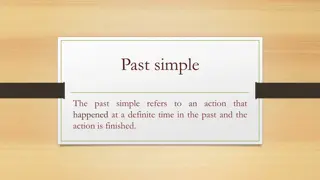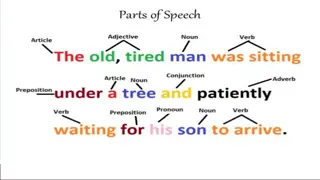Understanding Future Progressive Tense in English Grammar
Future Progressive Tense, also known as Future Continuous Tense, is used to indicate actions that will be ongoing at a specific point in the future. This tense emphasizes the continuous nature of an action happening in the future. Learn how to form and use the Future Progressive Tense through examples and exercises.
Download Presentation

Please find below an Image/Link to download the presentation.
The content on the website is provided AS IS for your information and personal use only. It may not be sold, licensed, or shared on other websites without obtaining consent from the author. Download presentation by click this link. If you encounter any issues during the download, it is possible that the publisher has removed the file from their server.
E N D
Presentation Transcript
Future Progressive Future Perfect Future Perfect Progressive
Future Progressive I WILL BE WAITING Auxiliary WILL invariable Auxiliary BE invariable Present participle (base+ING form) SUBJECT
Future Progressive The Future Progressive is often used in English as a way to talk about something happening at a given point in the future. This tense puts emphasis on the course of an action taking place in the future. The future progressive expresses action at a particular moment in the future. The action will have started before that moment but it will not have finished at that moment. Form: A: He will be talking. N: He will not be talking. Q: Will he be talking? Use: - action that is going on at a certain time in the future - action that is sure to happen in the near future - action in the future that overlaps another, shorter action (or time)
Future Progressive When we use the future progressive, our listener usually knows or understands what time we are talking about: I will be playing tennis at 10am tomorrow. They won't be watching TV at 9pm tonight. What will you be doing at 10pm tonight? What will you be doing when I arrive? She will not be sleeping when you call her. We'll be having dinner when the film starts. Take your umbrella. It will be raining when you return.
Future Progressive We can use the future progressive to talk about something that will happen if everything goes as we expect (sure to happen in the near future). It s usually possible to choose the simple future as well, but we often choose the future progressive because that way it s clear that we are not making a request or offer: The Government will be making a statement later. When will you be leaving? (This is more polite than when will you leave? because we are certainly not requesting that you leave). We can t use the future progressive with stative verbs, so if we want to use a stative verb in one of the situations where we would use the future progressive, in that case we use the future simple with will .
Exercises 1. At midnight we (sleep) __________________. 2. This time next week we (sit) ______________________ at the beach. 3. At nine I (watch) ____________________ the news. 4. Tonight we (cram up) ___________________ for our English test. 5. They (dance) ________________ all night. 6. He (not / play) _______________ all afternoon. 7. I (not / work) _______________ all day. 8. (eat / you) __________________ at six? 9. (drive / she) ________________ to London? 10. (fight / they) _______________ again?
Exercises Make the positive future progressive: At three o clock tomorrow 1. I ________________________ (work) in my office. 2. You ________________________ (lie) on the beach. 3. He ________________________ (wait) for the train. 4. She ________________________ (shop) in New York. 5. It ________________________ (rain). 6. We ________________________ (get) ready to go out. 7. They ________________________ (meet) their parents. 8. He ________________________ (study) in the library. 9. She ________________________ (exercise) at the gym. 10. I ________________________ (sleep).
Future Perfect YOU WILL HAVE FINISHED Auxiliary WILL invariable Auxiliary HAVE invariable Past Participle SUBJECT
Future Perfect The future perfect expresses an action that will be finished at a certain time in the future. It also expresses an action in the future before another action in the future. This is the past in the future: The train will leave the station at 9am. You will arrive at the station at 9.15am. When you arrive, the train will have left.
Future Perfect We use the future perfect to indicate the duration of an action that starts before and continues up to another action (or time) in the future. Usually we need 'for'. We often use the future perfect with stative verbs. At 4 o'clock, I'll have been in this office for 24 hours. We use the future perfect with a future time word, (and often with 'by') to talk about an action that will finish before a certain time in the future, but we don't know exactly when: By 10 o'clock, I will have finished my homework. (= I will finish my homework some time before 10, but we don't know exactly when).
Future Perfect It is possible to sometimes think of the Future Perfect like the Present Perfect, but instead of the viewpoint being in the present, it is in the future: You can call me at work at 8am. I will have arrived at the office by 8. They will be tired when they arrive. They will not have slept for a long time. "Mary won't be at home when you arrive." / "Really? Where will she have gone?"
Exercises 1. 2. 3. 4. 5. 6. 7. 8. 9. 10. (buy / she) _______________ the new car? By 9 o'clock we (cook) _____________ dinner. They (eat) ______________ by then. In one week he (cross) _________________ the Atlantic by boat. She (go) _____________ home. Jane (not / finish) _________________ her work. Fred (not / return) _______________ from his holiday by Monday. The sun (not / rise) ______________ by 4 o'clock. (do / you) _________________ the washing up by six o'clock? Our boss (not / leave) _______________ the office yet.
Exercises Make the future perfect. Choose positive, negative or question. 1. 2. 3. 4. 5. 6. 7. 8. 9. 10. she / get home by lunchtime?) __________________________________________ (I / leave by six) _____________________________________________________ (you / finish the report by the deadline?) __________________________________ (when / we / do everything?) ___________________________________________ (she / finish her exams by then, so we can go out for dinner) ___________________ (you / read the book before the next class) _________________________________ she / not / finish work by seven) ________________________________________ (when / you / complete the work? _______________________________________ (they / arrive by dinnertime) ____________________________________________ (we / be in London for three years next week) ______________________________
Exercises 11. (they / not / go at six) _____________________________________________________ 12. (you / do everything by seven?) ______________________________________________ 13. (we / not / eat before we come, so we ll be hungry) ______________________________ 14. (he / finish his exams when we go on holiday?) __________________________________ 15. (we / arrive by the time it gets dark?) __________________________________________ 16. (how long / you / know your boyfriend when you get married?) _____________________ 17. (he / not / complete the project by July) _______________________________________ 18. (I / not / finish the essay before the weekend) __________________________________ 19. (she / finish the cleaning by six?) _______________________________________ 20. (how long / you / be in this company when you retire?) ___________________________
Future Perfect Progressive YOU WILL HAVE BEEN WORKING Auxiliary WILL invariable Auxiliary HAVE invariable Auxiliary BE Past Participle Present Participle base+ING form SUBJECT
Future Perfect Progressive We use the future perfect progressive to talk about an event that will be in progress for some time before a specified time in the future: Janet will be really tired when we get home. She will have been looking after the children all day! It can be used to make predictions about events that will be in progress before a specified time in the future: Joe won t mind that we are late. He won t have been waiting long. It can also be used to predict (imagine ) what was happening in the past: What do you think the men were doing in the store room? Don t worry. They will have been unpacking boxes.
Future Perfect Progressive Both the fixed future time and the length of time are often mentioned in future perfect progressive sentences. We normally need 'for + length of time : By the end of this week, I ll have been working here for five months. Fixed future time: Length of time: five months the end of this week But this is not always the case: Anne will be in a bad mood at the party this evening because she ll have been doing housework.
Future Perfect Progressive We can use the future perfect progressive, like the other perfect progressive tenses, to talk about something that finishes just before another time or action (in this case, in the future). It's often used because there will be a result at the second point in the future. When I see you, I'll have been studying, so I'll be tired. If we use 'when' or 'by the time', we usually use the present simple in the subordinate clause.
Exercises Make the future perfect progressive. Choose the positive, negative or question form: 1. 2. 3. 4. 5. 6. 7. 8. 9. 10. She _________________________________ (play) squash, so she won t be dressed up. I ______________________________ (work) all weekend so I won t be energetic on Sunday night. How long _____________________________ (you/ wait) when you finally get your exam results? Julie ______________ (not/eat) much, so we ll need to make sure she has a good meal when she arrives. How long _____________________________ (she/plan) to move out when she finally moves? __________________________________ (she/wait) long by the time we get there? ___________________________ (he/play) computer games for ten hours when he finally stops? They _____________________________ (study) all day, so they ll want to go out in the evening. They _______________________________ (not/stay) in the hotel for long when she arrives. I __________________________________ (not/walk) when I meet you I ll have been cycling.
Exercises 11. We ______________________________ (look) at houses for four months next Tuesday. 12. We _______________________ (not / do)this project for long when the inspector arrives. 13. How long _____________________________ (you / work) on this project when it is finished? 14. __________________________________ (you / buy) clothes when I see you? 15. He _______________________ (not / do) much work, so he ll be happy to start a new project. 16. How long _____________ (the children / sleep) in the living room when their new bedroom is ready? 17. How long __________________________________ (he / train) when he enters the competition? 18. __________________________________ (you / take) exams the day we meet? 19. I __________________________ (answer) students questions all morning, so I ll want a quiet lunch. 20. __________________________________ (they / travel) for long when they arrive?
Exercises 1. By the end of the week I (work) _______________ here for four months. 2. By the end of this month we (live) ________________ together for six years. 3. By the end of the term she (study) _________________ for nine years. 4. By midnight we (play) __________________ this computer game for 48 hours. 5. She (talk) __________________ on the phone for the last couple of hours. 6. They (look for) __________________ me all night long. 7. He (play) _________________________ soccer all day long. 8. You (watch) _______________________ TV all the time. 9. He (not / sleep) ____________________ all morning. 10.(wait / they) _________________ for 2 hours?


